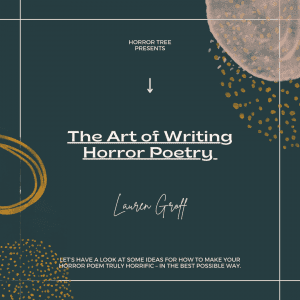The Art of Writing Horror Poetry
 The Art of Writing Horror Poetry
The Art of Writing Horror Poetry
By: Lauren Groff
Horror writing is a slippery fish. Cliches lurk in the bushes, tired out tropes haunt the halls, and there is a certain demonic pressure that comes with setting out to be deliberately ‘scary.’ Writing horror poetry brings its own particular challenges but the form is, arguably, perfectly suited to the genre; verse allows for a flow, an ambiguity, a sense of dislocation and dreaminess that can serve the spooky very well indeed, when played with just the right touch. Let’s have a look at some ideas for how to make your horror poem truly horrific – in the best possible way.
Bringing the Fear
The most fundamental thing to note is that, if it scares you, and you can write about it convincingly, you’ve got a good chance of it scaring me as a reader. At the very least I’m going to buy into a level of dread or feeling of uncertainty, and these are great things to be aiming for in the world of horror writing.
Form, rhyme structure, verse length – choose whatever serves you and the poem, there are no rules here. Experiment with your subject matter, see what works well and what doesn’t, free-write and make messy drafts until you discover the form your horror poem wants to take.
“Bring all the senses into play when you’re writing your poem; evoke touch, taste, smell and sound in order to draw your reader deeper into the world you’re creating; this authenticity will allow your reader to empathise with your narrator and feel their disquiet,” suggests Rebecca Adams, a writer at Assignment Help and Essay Services.
The best horror writing is effective in its propensity at NOT showing, but at hinting, which allows the reader’s imagination to run wild. Metaphor and simile can be used to this end to subtly light the dark without shining a torch-beam on it – and those shadows look pretty creepy when they’re jumping about, right? Choose your words with care, to encourage dread: a forest isn’t ‘green and lush,’ it’s ‘scrub-strangled and rank;’ the bunnies within aren’t ‘hopping,’ they’re ‘lurking.’ See what I mean?
How Not to Douse the Dread
Firstly, there are some topics that are more well-trodden than others: your vampires, your werewolves and the like. This isn’t to say you can’t cover that ground; but it would be a good idea, if you’re taking one of those roads, to cover it in a way that hasn’t been done before. By bringing something new to the table, you are immediately setting up the fear factor to your advantage.
Better still: make it personal. As we covered at the start, if you’re tapping into your own fear, there’s a good chance that that authenticity is going to push my creeped-out button too. If there was a particular part of the playground that made you feel nervous as a kid, describe that anxiety, use a disjointed verse form to increase the unease, suggest what could be hiding under the slide, use the rhythm of your poem to ratchet up the tension. There doesn’t necessarily need to be a drop of blood in sight.
“Lastly, avoid fretting too much at the drafting stage; write without self-limitation, let your ideas flow and edit and re-write later; see what dark path the poem wants to lead you down and follow it,” says Hillary Larson, a writer at Eliteassignmenthelp and Assignment writing services.
Finding Your Voice
Horror poetry, like all poetry, comes in many shapes and sizes, from two-line snippets of the sinister to epic tomes of the terrible. Think about how to choose your structure, and how to marry content and form to best effect, fusing the style of your writing with the form it takes on the page: T S Eliot uses this to devastating effect in The Wasteland; the way the poem morphs between structural styles throughout enhances the sense of growing dislocation, loss and philosophical uncertainty that the poem itself is concerned with. Read your poem aloud at frequent stages of the writing, to get a sense of the tone inspired by the rhythm and timbre.
Find your true voice – pay homage to other writers, but don’t feel the need to emulate them – and honour it. As a horror reader, I’m ready and willing to be scared: so take my hand and lead me into the dark trees, the haunted hotel, the seemingly innocent playground of your imagination; just please don’t let go.
Lauren Groff writes for Lia Help and Big Assignments and is an editor at Best Essay Services; she writes extensively on the art of poetry writing.
- About the Author
- Latest Posts
The Horror Tree is a resource for horror authors which was created in 2011. The main goal when starting the site was to include all of the latest horror anthologies and publishers that are taking paying submissions. A resource useful for both new and experienced publishers alike looking for an outlet for their written material!












